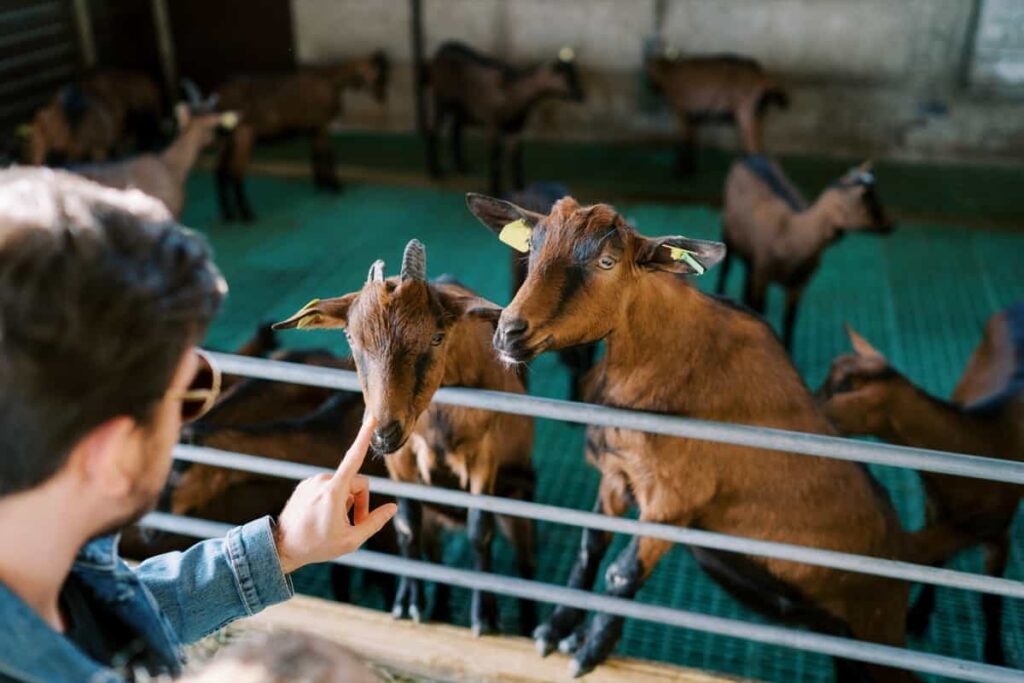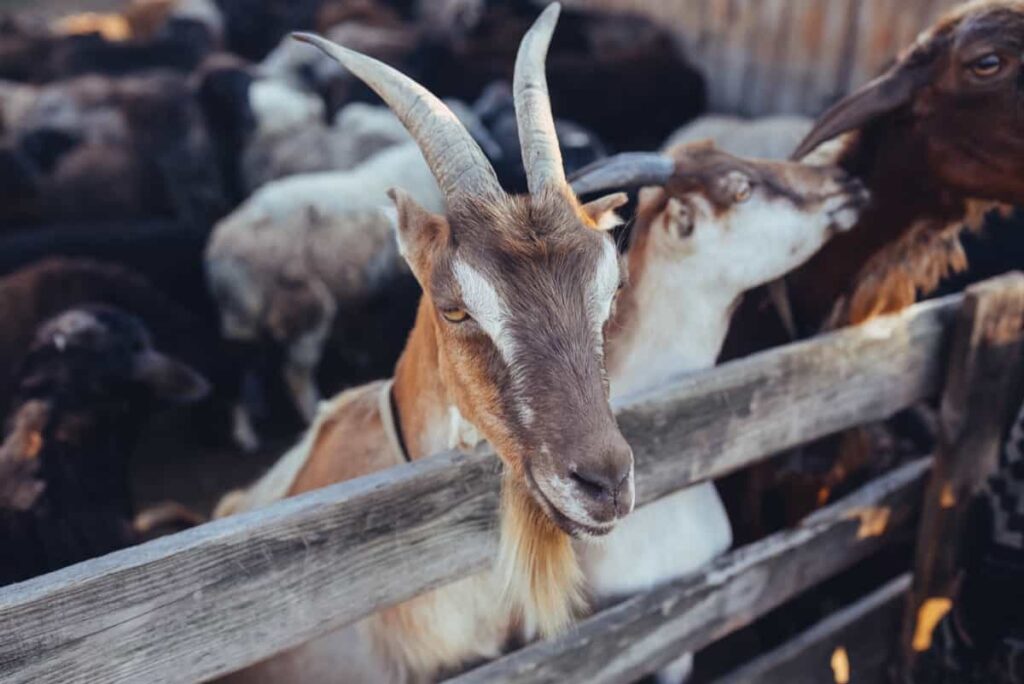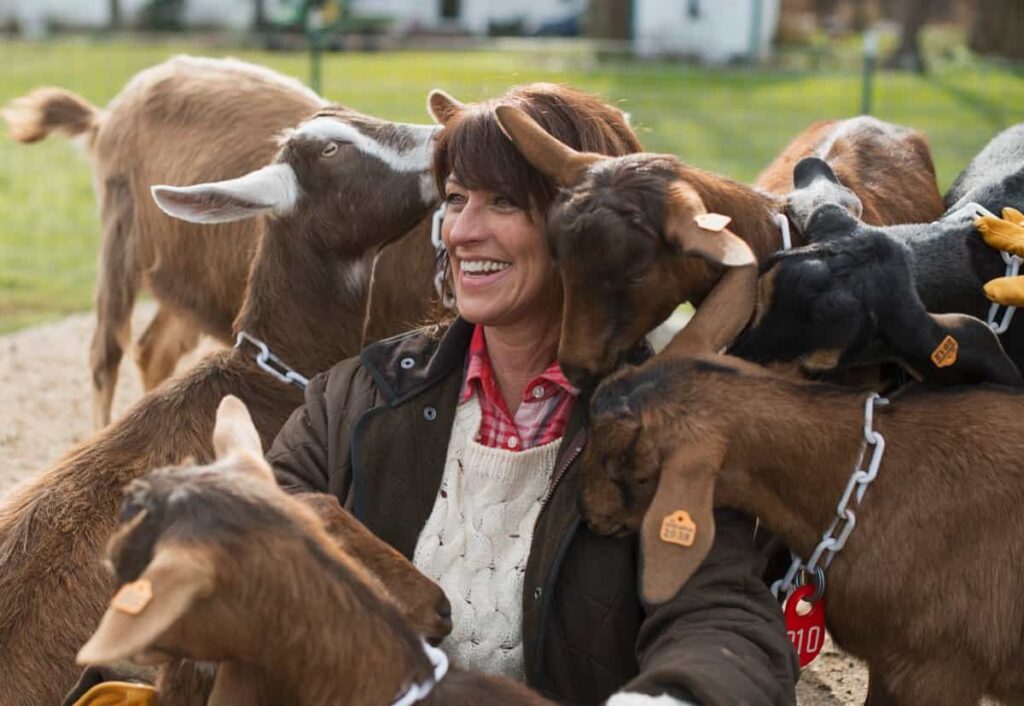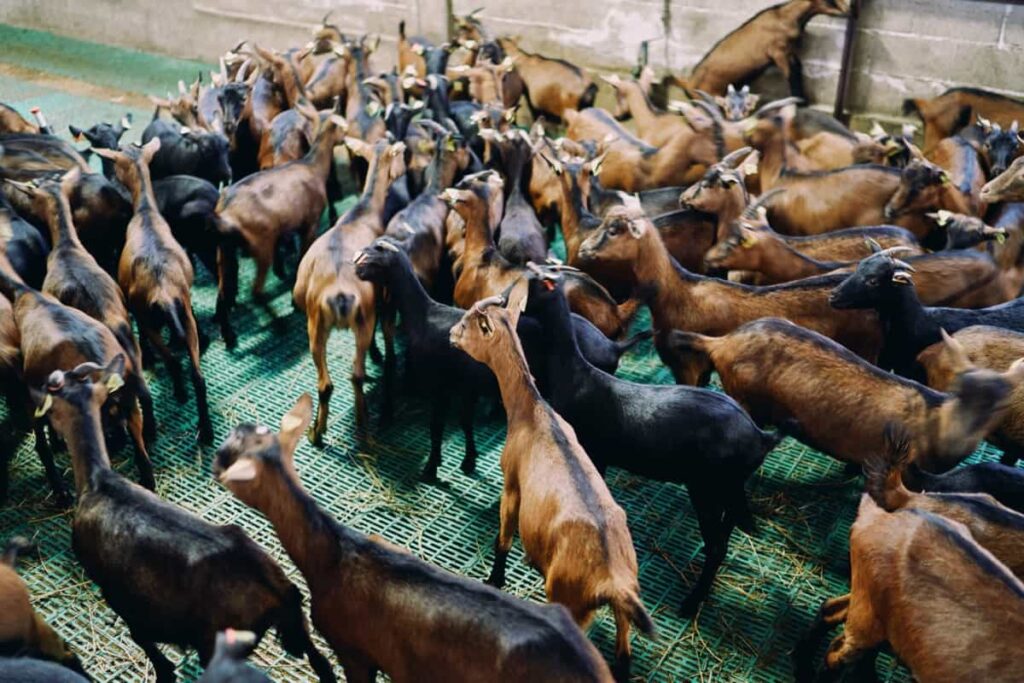Andhra Pradesh, a state known for its diverse agriculture, is also a hub for goat farming. This blog explores the current state of goat farming, focusing on prevalent breeds, and examines the government’s policies and support initiatives in the sector.

Goat Farming in Andhra Pradesh
An Overview of the Industry’s Current Status
Goat farming in Andhra Pradesh is a profitable and sustainable agricultural activity, contributing to rural development, employment generation, and food security. With a population of 9.8 million goats, the state ranks fourth in goat meat production, with an annual output of 1.2 lakh metric tons.
However, challenges such as lack of quality breeding stock, inadequate feed and fodder resources, high incidence of diseases and parasites, low adoption of scientific management practices, and poor marketing infrastructure hinder the industry. With proper planning, investment, and management, goat farming can be a good source of income for farmers in Andhra Pradesh.
Different Breeds of Goats Found in Andhra Pradesh and Their Characteristics
- Deccani Goat: Found in Bombay-Deccan and Karnataka, the Deccani is a small, robust breed, a blend of Rajasthan’s woolly and Andhra Pradesh’s hairy goats. It thrives in tough conditions, has black and gray fleece, and is primarily reared for meat.
- Sirohi Goat: Originating from Rajasthan, also known as Ajmeri or Devgarhi, the Sirohi is medium sized with a compact body and strong legs. Its coat is mostly brown. Well-suited for stall feeding and semi-intensive farming, it yields both meat and milk.
- Gohilwadi Goat: A large, versatile breed from Gujarat and Andhra Pradesh, the Gohilwadi has long legs, a convex profile, a white coat with black or brown spots, and twisted horns. It’s used for milk, meat, hair, and manure production.
- Mecheri Goat: Native to Tamilnadu’s Salem, Erode, Karur, Namakkal, and Dharmapuri districts, the Mecheri is a medium-sized breed popular for meat. It has a slender tail and is known for its hardiness.
In case you missed it: Andhra Pradesh Organic Farming: For Vegetables, Herbs, Fruits, Millets, Crops, Livestock, and Aquaculture

Government Policies and Support
- National Livestock Mission (NLM): This scheme focuses on improving livestock productivity and profitability. It offers assistance in feed and fodder development, breed improvement, healthcare, risk management, and skill development. It also supports the establishment of fodder banks, silage units, and feed processing facilities.
- Andhra Pradesh Sheep and Goat Development Cooperative Federation Limited (APSGDCF): Provides low-interest loans for buying improved goat breeds and organizes training and exposure visits for scientific goat rearing.
- Andhra Pradesh Livestock Development Agency (APLDA): Conducts breed improvement through artificial insemination, distributes quality bucks, and organizes health camps and vaccination drives.
Financial Assistance and Incentives Provided by the Government
NABARD Loan for Goat Farming
- Purpose: Provides loans for establishing goat farms.
- Subsidy: 33% for underprivileged and SC/ST; 25% for OBC and general category, up to ₹2.5 lakh.
- Repayment: Up to 12 years.
90% Subsidy on Goat, Sheep & Pig Farming
- Purpose: Encourages farming of goats, sheep, and pigs.
- Subsidy Distribution: 60% from the central government and 30% from the state government.
- Beneficiary Contribution: Goat and sheep farmers pay ₹6600; pig farmers ₹2100.
Government Subsidy for Goat Farming
- Purpose: Supports setting up goat farms.
- Benefit: 50% to 70% subsidy on costs like buying goats, shed construction, and essential equipment.
- Eligibility: All farmers are eligible.
Role of Andhra Pradesh State Agricultural University in Developing and Improving Goat Farming Practices
The role of Andhra Pradesh State Agricultural University (ANGRAU) in developing and improving goat farming practices is significant. ANGRAU researches various aspects of goat farming, such as breeding, feeding, health management, and marketing. ANGRAU also offers training programs for farmers, entrepreneurs, and extension workers who are interested in goat farming.
ANGRAU has released several improved varieties of crops that are suitable for goat fodder. ANGRAU also collaborates with other research institutes, such as the Central Institute for Research on Goats (CIRG) in Mathura, to enhance the productivity and profitability of goat farming in Andhra Pradesh.
Challenges Faced by Goat Farmers in Andhra Pradesh and How the Government is Addressing Them
Goat farming in Andhra Pradesh offers significant livelihood opportunities but faces challenges such as inadequate quality breeding stock, feed and fodder scarcity, limited veterinary services, and poor marketing facilities.
In case you missed it: Growing Tomatoes Organically in Andhra Pradesh: Requirements, Planting to Harvesting Guide for Beginners

To counter these, the Andhra Pradesh government has implemented measures like establishing goat breeding centers for quality stock and healthcare services, promoting fodder cultivation with resources and guidance, enhancing veterinary services, including mobile clinics and disease control programs, and improving marketing facilities through infrastructure development and farmer cooperatives. These initiatives aim to boost productivity, health, and income in the goat farming sector.
Impact of Climate Change and Adaptation Strategies
Climate change poses a significant risk to goat farming in Andhra Pradesh, India. Rising temperatures, unpredictable rainfall, and increased incidence of diseases threaten this vital livelihood source. A study predicts a 2.5% decline in goat population and a 3.6% drop in milk yield by 2050. To combat this, key adaptation strategies include.
- Selective Breeding: Using genetics and biotechnology to enhance goat breeds.
- Resource Management: Ensuring sufficient feed and water through techniques like hydroponics and water harvesting.
- Healthcare Improvement: Implementing preventative health measures and using AI for disease diagnosis.
- Income Diversification: Combining goat farming with other agricultural practices for a more stable income.
- Institutional Support: Providing farmers with better access to credit, insurance, and market opportunities.
Market Trends and Opportunities
Goat farming in Andhra Pradesh, India, presents lucrative opportunities due to its favorable climate and soil conditions. Key goat breeds such as Deccani, Sirohi, and Black Bengal are reared mainly for meat and milk, contributing to other sectors like fiber and leather. The growing urban demand for goat meat and milk, noted for health benefits and suitability for lactose intolerance, enhances market potential, including exports to neighboring countries.
The state government supports this sector with subsidies for infrastructure, feed, veterinary care, and training, reducing costs and promoting quality. Modern farming practices, breed selection, efficient management, and market linkages are crucial for farmers to capitalize on these opportunities, promising significant income, employment prospects, and contributions to the state’s economy and food security.
Collaboration between Farmers, Government, and Private Sector to Boost Goat Farming in Andhra Pradesh
Goat farming in Andhra Pradesh, a potentially profitable venture, faces challenges like limited quality breeding stock, inadequate veterinary services, and poor marketing. Collaboration among farmers, government, and the private sector is key to overcoming these hurdles. Farmers gain access to superior goat breeds, training, health care knowledge, and collective bargaining power.
The government can bolster this by offering subsidies, setting up health centers, and promoting policies and goat products. Private sector involvement can bring investments in processing, provide quality inputs, and innovate in marketing. This synergy can transform goat farming into a sustainable source of income and employment and contribute to the state’s economy and food security.
Future Prospects and Sustainability
The goat farming industry in Andhra Pradesh has considerable prospects for expansion and long-term viability. The plan is fascinating because of its capacity to adapt to various climates and its minimal investment costs. The extensive rural regions in the region provide abundant grazing land, which is essential for economically efficient feeding. Moreover, goats exhibit remarkable fertility, guaranteeing a consistent growth in population.
The increasing local demand for goat meat and milk is enhancing market prospects. Government efforts and subsidies further enhance the sector’s prospects. Nevertheless, it is important to handle difficulties such as illness management and market changes. By implementing strategic planning and adopting sustainable techniques, goat farming in Andhra Pradesh has the potential to contribute significantly to the rural economy.
In case you missed it: Growing Red Chilli Organically in Andhrapradesh: Farming Practices and Production Management

Frequently Asked Questions (FAQ on Andhra Pradesh Goat Farming
What Are the Main Products Obtained from Goat Farming?
Primary products include goat meat (chevon), milk, skin, and fiber, with meat being the most sought-after.
What Are the Opportunities for Exporting Goat Products from Andhra Pradesh?
With proper quality standards and certification, there are opportunities to tap into international markets, especially in regions with high demand for goat meat and products.
Conclusion
Andhra Pradesh’s goat farming is thriving, featuring diverse breeds and substantial government backing. Policies focus on breed improvement, farmer training, and financial support, fostering a robust industry benefiting rural economies and contributing to sustainable agricultural practices.
- Aquaponic Farming at Home: A Step-By-Step Guide
- Profitable Village Farming Business Ideas in 2024
- High-Yield Aquaculture: Fast-Growing Fish for Farming
- Effective Fish Pond Construction Techniques for Beginners
- Irrigation and Water Management in Pineapple Farming
- Blossom to Harvest: Mastering Flowering and Pollination in Papaya Farming
- Pig Fattening Essentials: From Selection to Sale for Beginners
- Raising Wagyu Cattle: A Complete Guide for Premium Beef Production
- Soil Types and Their Water Holding Capacity
